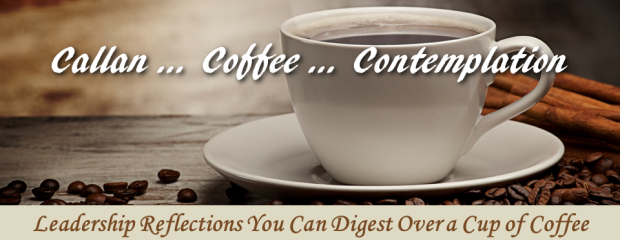Callan…Coffee…Contemplation for the Week of June 15th
Trigger Moments
At times in life we’ll find ourselves mired in ruts; plateaus of growth where we feel more victim than captain of our destiny. I’ve had several of these plateaus in my life where I was in a state of doldrums marked by stagnation and slump. But in each of these doldrums, break out occurred only when I reawakened to a trigger moment; a catalytic spark inside me when, after long periods of feeling a lack of internal agency, I then rediscover it. These trigger moments, as far as I can tell, occur when we reawaken our motivation and the internal criteria by which we want to lead our lives. When we lack this inner criteria we move into the doldrums and drift sideways. When we rediscover our agency a positive wind fills our sails and we move more purposely toward the horizon. Why is this important? Everyone will find themselves in the doldrums; that’s a fact. The key is to break out and to know the breakout will always be a mysterious combination of personal agency and grace. The trigger moments are not automatic; we must push ourselves forward to find and ultimately harness the wind.
M2
When working out yesterday a fellow gym rat asked me what I thought it took to become a premier athlete. I contemplated this for a moment and answered: Mindset and Means. M2. A truly great athlete has both the proper mindset (optimism, focus, determination, grit) coupled with the means to excel (practice, opportunity, and experience). The same is true of great leaders, who also must learn to master M2. Great leaders constantly work on their mental paradigm while simultaneously seeing every day, and every moment, as a chance to hone their craft. This insight is very important for all of us because it helps us understand how best to cultivate leaders; we must attend to both elements—mindset and means. All of our leadership training and development should intentionally combine activities intended to nurture and strengthen our leadership mindset while also exposing us to opportunities ripe with experiences calling forth excellence. Like a great boxer, leadership excellence is defined both inside and outside the ring.
Submitting to Excellence
When we think of true championship performance, whether in business, sports, or academics, we often try to measure the difference between good or great in terms of costs. We seek tangible measures, things we can readily point to. I think this can be somewhat misleading, for though I do agree there are elements of excellence which can be quantified, the deeper, and ultimately more crucial elements to greatness, cannot. Excellence is not something we procure at cost, it is, in the final analysis, something we submit to. Only until individuals and the collective group willingly submit to excellence will champions and heroic ambition emerge. And we submit by acknowledging a purpose beyond our self, and equally, by bowing to a meaning greater than self. Excellence is not a matter of counting the cost; it is arriving at a state of mind where we strive, and sacrifice, without counting the cost.
Commitment
A growing characteristic of our modern world is what I call Opportunity Mania. Due to technology and the hyper-connectivity it affords, many people are increasingly bombarded with endless choices and options. Not bad, per se; but we have to wonder if, in the pursuit of endless choices, we are losing our appreciation for commitment? When we become mired in opportunity mania we become attracted to the endless choices; it’s like an opiate. But in truth we may never actually make a choice and commit. We like the stimulation of the choices. Excellence, as far as I can discern, involves hard choices and yes—commitment. Greatness comes when we move from a fragmentary life into a committed and cohesive one. We must move from opportunity mania—the constant hopping from one lily pad to another—to a life of fidelity, purpose, and meaning. The goal is not mindless choices, but rather, choosing, and choosing well. I believe greatness is born not of endless opportunities, but from actually closing off some of the mindless opportunities and actually committing to something larger than self.
Better Than You Used to Be
It’s easy to get confused in terms of leadership development. There’s so much information available now; so many choices. So I thought; how can we simplify the goal of leadership development? Here’s my answer: Be better than you used to be. That short and crisp objective contains all the basic elements of significance. First, the focus of getting better is put squarely on our shoulders. We need to be accountable for our development, our behavior, and our attitude. Second, the goal is not a final destination, but a process. “Be better” implies we must keep being better; day by day, activity by activity, encounter by encounter. Third, this goal cautions us to not get comfortable with status quo. Getting better suggests self awareness, grit, determination, and accountability. Finally, this goal reminds us that character development and excellence are slowly imprinted. Development simply takes time and is often imperceptible. Want a leadership goal? Be better than you used to be.
Check back next Monday for a round up of this week’s social media shares. Or check us out on Facebook, Twitter, Google+, or Pinterest to see our posts every day!
Tweet Share






